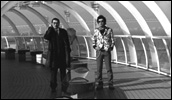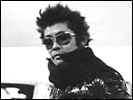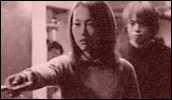A Forest With No Name
- Year
- 2002
- Original title
- Shiritsu Tantei Hama Maiku Namae no Nai Mori
- Japanese title
- 私立探偵濱マイク 名前のない森
- Alternative title
- Mike Yokohama - A Forest With No Name
- Director
- Cast
- Running time
- 71 minutes
- Published
- 7 November 2002



by Tom Mes
Comparison between his work and that of his former mentor Kiyoshi Kurosawa is something Shinji Aoyama will probably never escape from. Although after seven years and thirteen films he certainly deserves to be regarded as a filmmaker in his own right, similarities in themes and approach between the two directors are still rife. Aoyama was assistant director to Kurosawa in 1994 and 1995 on four films, including The Guard from Underground, as well as appearing as an actor in later films License to Live and Barren Illusion. Both directors perpetually operate in the grey zone between genre cinema and art film, but Aoyama has said that the two men have an unwritten agreement never to stray into each other's territories. With A Forest With No Name however, Aoyama comes closer than ever to actually trespassing.
The territory he treads on here is the sylvan wilderness of Kurosawa's unclassifiable Charisma (1999), with which it shares both the theme of the individual versus society and the symbolism of the tree and the forest as applied to it. Despite the resemblance, Aoyama's film is thankfully more than just a slavish copy, offering a situation that's rather more concrete and focused than Kurosawa's canvas of broad strokes.
Aoyama's individualist is Mike Hama P.I. (prolific Masatoshi Nagase), a goofball kitted out in ersatz punk attire who keeps the world at arm's length, including friends and informants. Hired by a rich industrialist (Harada) whose daughter ran away in an attempt to "find herself", Mike drives out into the countryside to infiltrate the new age sect the girl has joined. Living cloister-like in an isolated house amid the woods, the cult welcomes Mike into its midst, although the detective sticks out like a sore thumb among the demure, docile constituents. In fact, the cult is the opposite of Mike's individualism, and for an organisation that purports to offer people the opportunity to find their inner selves it puts an awful lot of emphasis on obedience and equality. When his attempts to persuade the industrialist's daughter to leave the compound fail, Mike finds himself increasingly drawn in by the gentle but persistent words of the sect's enigmatic female leader. When she tells him that the surrounding woods contain a tree that looks just like him, Mike can't resist his curiosity and follows her on a hike into the forest.
Extending the symbolism of Charisma, Aoyama not only compares the individual to a tree and society to a forest, he more overtly states that despite all its individuality, the tree is still part of the forest. Mike's individualism is the result of his own attempts to set himself apart from the rest of society. He is not an outcast ostracised for being different, even though that's what he would like to believe. In fact, he makes strenuous attempts to make himself believe it: every time his client refers to him as "Mike-san" or "Mr. Detective" (the use of 'san' and the job description underlining that Mike is just another part of society), the private eye frustratingly continues to remind him to simply call him Mike.
Within the cult however, names are forbidden and everyone is referred to by number. As a result Mike is forced to face up to his self-delusion. When Mike encounters the tree that supposedly looks like him, Aoyama wisely keeps it unseen, focusing instead on the effect the encounter has on the character's self-image. The private eye later dreams of a human-shaped tree with his own face protruding, immobile and expressionless, from the bark - he may be recognisable as an individual, but he's still a tree like all the others that form the forest.
A Forest With No Name is an entry into Yomiuri TV's Shiritsu Tantei Hama Mike (The Private Detective Mike Yokohama) series, based on the character created by director Kaizo Hayashi for a trilogy of mid-90s detective films (The Most Terrible Time in My Life, Stairway to the Distant Past and The Trap, all starring Nagase as Mike Hama). While Hayashi's films were post-modern homages to film noir, the TV series gave the style a good overhaul and turned Mike from a classic down-on-his-luck private dick into an abrasive punk rocker complete with plaid bondage pants and Doc Martens.
Each episode of the 12-part series, which aired during the summer of 2002, was directed by a different filmmaker, including such luminaries as Sogo Ishii, Shinobu Yaguchi (Waterboys) and Isao Yukisada (Go), with the penultimate episode helmed by Liverpudlian iconoclast Alex Cox (and, for extra cool points, a title sequence by British fashion photographer Glenn Luchford). In addition to the TV versions (running 45-55 minutes in length), each of the contributing filmmakers also delivered a feature-length 'director's cut' of his own instalment, intended for DVD release and foreign distribution (with the protagonist rechristened Mike Yokohama).
Aoyama's entry, which was the first to be completed though not the first to be aired, was even selected to the Berlin Film Festival in early 2002 in its lengthened form. It helped the director regain some of the ground lost by the disappointing reception for his previous film Desert Moon. Coming hot on the heels of the almost universally acclaimed Eureka, Desert Moon was selected for Cannes but met with a mostly indifferent reaction from critics and jury members. Audiences felt largely the same way and in the few territories where it was released it made hardly a ripple at the box office.
Intriguing as it is, given its minimal length and far from easy-to-digest subject matter, A Forest With No Name is unlikely to have much more in the way of international commercial success than Desert Moon. Then again, if Eureka showed anything, it's that unusual running times and heavy issues do not necessarily equal box office poison.